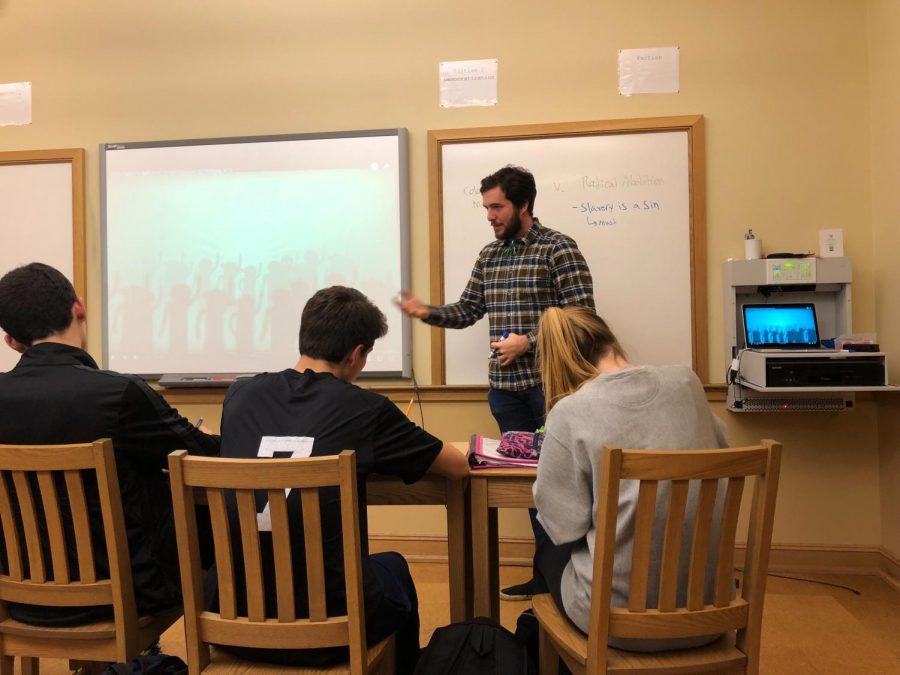Diversity vs. Decolonization: Teachers discuss diversity in faculty and curriculum
Credit: Sophia Thomas
Steele Sternberg teaches Upper School History to the ninth and tenth grade, and has an elective focusing on the Middle East. The ninth grade curriculum focuses on world history, and the tenth grade curriculum focuses on American history leading up to the 20th century. Sternberg explained that the History curriculum as a whole embraces a western canon.
February 6, 2019
Hackley is a place that prides itself on its inclusivity, an idea illustrated by the Hackley motto, “Enter here to be and find a friend.” Hackley not only strives to be an inclusive community, but also a diverse one that represents a large number of economic, racial, and ethnic groups. The student body is composed of many voices where numerous races, classes, and nationalities can be found engaging in discussions about identity, politics, or current events.
Despite the richness of diversity that already exists at Hackley, through reflection in the strategic plan, a plan created to evaluate Hackley’s future growth, an acknowledgment has been made that there is room for even more opportunities to explore multiple perspectives. The plan briefly mentioned the desire to have an emphasis on diversity, and the Dial interviewed members of the community to share their thoughts and define what this could mean for the school’s future.
Diving deeper into specific departments like the English department, James Flanigan, an Upper School English teacher, spoke about his efforts to have conversations about race, class, and gender, and described the process of doing so. He said, “Whenever I talk about curriculum and whenever I talk about diversity, I like to distinguish between diversifying things and decolonizing things.” The difference between these ideas is that decolonizing is a more conscious effort to include different voices that enable students to not only see themselves but feel self-empowered.
He further explained saying, “[In a] decolonized mindset, you start thinking about what are the structures that have led to a narrative and how can we use those structures to talk about things like whiteness in fiction, people of color, othering, [etc].” He mentioned that power structures were important to keep in mind when making decisions about which books to include. In terms of room for improvement, he stressed the importance of considering things relatively saying, “I think we do a nice job of offering a relatively diverse curriculum in the 11th grade [but] I think we need [to do] a lot of work… in the 10th grade.
“It is about recentering the conversation.”
Steele Sternberg, an Upper School history teacher, discussed the history curriculum and its ability to include diverse voices.
“I think our curriculum very much still embraces a western canon,” he said, “There is a set core knowledge about the History of Europe and the United States…that [our current curriculum implies] you need to learn.”
This description of the current approach better brings into focus where Hackley stands diversity-wise within the history curriculum. He continued with examples saying, “You’re not talking about African kingdoms independent of European colonization. The reason African kingdoms make it into the 9th grade curriculum is because of the Europeans because they’re part of the European story.”
Another area for growth within the Hackley community is in regard to faculty. While they represent a qualified group of people with different upbrings and stories, there exists a lack of racially diverse members. When asked about the lack of racial/ethnic diversity within the faculty, Amanda Esteves-Kraus, an Upper School biology teacher and faculty advisor of UNITY, mentioned room for improvement.
“I think for students, it’s a huge weakness because [students] learn better from a diverse set of humans. You think better, you’re pushed, and it opens everyone’s minds,” she said. “It’s [also] important for students to see themselves in people that teach them.” This brings attention to the pre-existing need for more representation within the faculty, to benefit and more accurately reflect the student body.
While Hackley does a relatively good job in creating a diverse student body and attempting to include diversity in the curriculum, it is still the responsibility of any school to continue to grow and change with the times. The world is ever-shifting and morphing daily into a different place, and it is important that Hackley does the same, possibly through diversifying the faculty and adding to the curriculum in order to include more voices and perspectives.
Willie Teacher, a Middle/Upper School acting teacher and faculty advisor of UNITY, ends the conversation in a thoughtful way saying, “It’s a love movement, because, as I recently heard a speaker say, ‘justice is what love looks like in action.’ I am proud that Hackley, in its own way, is seeking to be a more than just community.”

